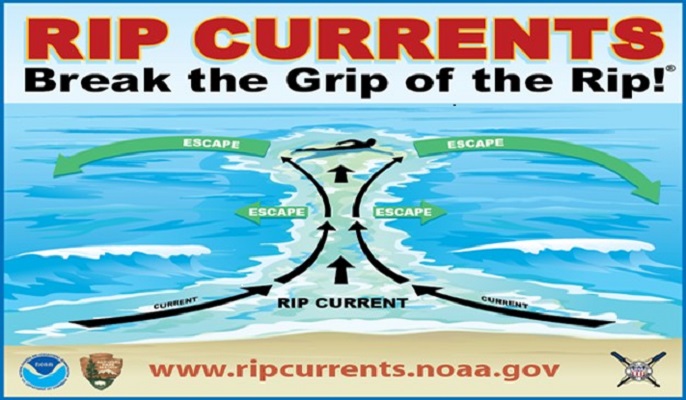News Release
You are viewing ARCHIVED content published online before January 20, 2025.
Please note that this content is NOT UPDATED, and links may not work. For current information,
visit https://www.nps.gov/aboutus/news/index.htm.

NOAA Photo
|
Subscribe
|
Contact: B.G. Horvat, 252-728-2250, ext. 8906
HARKERS ISLAND, N.C. – With 56-miles of ocean beach for visitors to enjoy, Cape Lookout National Seashore would like to remind visitors to remember common ocean swimming hazards, especially rip currents.Rip currents are channeled currents flowing perpendicular away from the beach. Typically, they extend from near the shoreline, through the surf zone, past the line of breaking waves. They can range in size from 10 feet wide up to 100 feet wide. The length of the rip current varies with the sandbar that the water is breaking upon.
Rip current speeds vary. They can be too slow to be considered dangerous, but under certain wave, tide, and beach conditions the speeds have been measured to exceed 5 m.p.h., which is faster than an Olympic swimmer can swim.
The greatest surf zone hazard beachgoers face is rip currents, which can sweep even the strongest swimmers out to sea, and are particularly dangerous for weak and non-swimmers. Drownings occur when people are pulled offshore by a rip current, unable to keep themselves afloat and swim to shore. This is likely due to any combination of fear, panic, exhaustion, or lack of swimming skills.
Park Rangers suggest if you find yourself caught in a rip current, do not swim against the current. Instead, conserve your energy and remain calm, while swimming across the current (parallel with the beach), slowly working your way back to shore at an angle. It may also prove useful if you can use the power of the surf to help push you back to the beach. Signal for help if it is available.
Above all, know your swimming area and abilities. If possible, within the national seashore boundary, it’s always a good idea to swim on sound-side beaches where there is less wave action for rip currents to form. Please be aware that there are no lifeguards on any of the beaches at Cape Lookout National Seashore. Swim at your own risk, with a buddy or appropriate adult supervision.
Last updated: June 19, 2018
